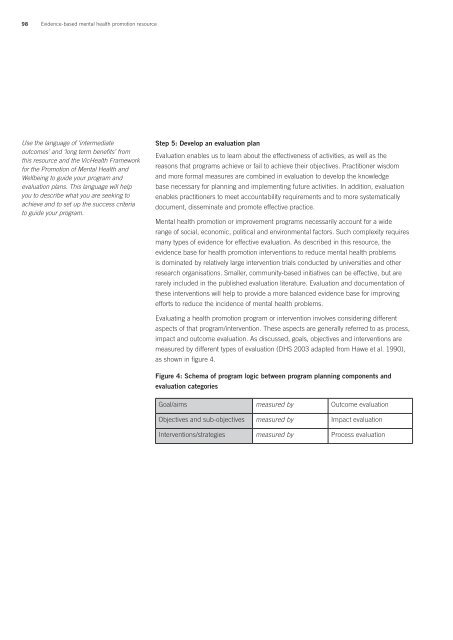Evidence-based mental health promotion resource - health.vic.gov.au
Evidence-based mental health promotion resource - health.vic.gov.au
Evidence-based mental health promotion resource - health.vic.gov.au
You also want an ePaper? Increase the reach of your titles
YUMPU automatically turns print PDFs into web optimized ePapers that Google loves.
98 <strong>Evidence</strong>-<strong>based</strong> <strong>mental</strong> <strong>health</strong> <strong>promotion</strong> <strong>resource</strong>Use the language of ‘intermediateoutcomes’ and ‘long term benefits’ fromthis <strong>resource</strong> and the VicHealth Frameworkfor the Promotion of Mental Health andWellbeing to guide your program andevaluation plans. This language will helpyou to describe what you are seeking toachieve and to set up the success criteriato guide your program.Step 5: Develop an evaluation planEvaluation enables us to learn about the effectiveness of activities, as well as thereasons that programs achieve or fail to achieve their objectives. Practitioner wisdomand more formal measures are combined in evaluation to develop the knowledgebase necessary for planning and implementing future activities. In addition, evaluationenables practitioners to meet accountability requirements and to more systematicallydocument, disseminate and promote effective practice.Mental <strong>health</strong> <strong>promotion</strong> or improvement programs necessarily account for a widerange of social, economic, political and environ<strong>mental</strong> factors. Such complexity requiresmany types of evidence for effective evaluation. As described in this <strong>resource</strong>, theevidence base for <strong>health</strong> <strong>promotion</strong> interventions to reduce <strong>mental</strong> <strong>health</strong> problemsis dominated by relatively large intervention trials conducted by universities and otherresearch organisations. Smaller, community-<strong>based</strong> initiatives can be effective, but arerarely included in the published evaluation literature. Evaluation and documentation ofthese interventions will help to provide a more balanced evidence base for improvingefforts to reduce the incidence of <strong>mental</strong> <strong>health</strong> problems.Evaluating a <strong>health</strong> <strong>promotion</strong> program or intervention involves considering differentaspects of that program/intervention. These aspects are generally referred to as process,impact and outcome evaluation. As discussed, goals, objectives and interventions aremeasured by different types of evaluation (DHS 2003 adapted from Hawe et al. 1990),as shown in figure 4.Figure 4: Schema of program logic between program planning components andevaluation categoriesGoal/aims measured by Outcome evaluationObjectives and sub-objectives measured by Impact evaluationInterventions/strategies measured by Process evaluation



